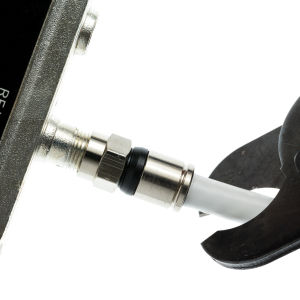Members of the Congressional Black Caucus expressed skepticism last week that the Federal Communications Commission’s move to open up cable providers’ content to third-party set-top boxes wouldn’t marginalize minority programmers.
New York Rep. Yvette Clarke used the kickoff of the congressional Multicultural Media Caucus Thursday to take aim at the FCC’s proposal to unlock the set-top box — a move she said has no guarantee of opening up the marketplace for “diverse and independent programmers” to “gain more visibility.”
“While I understand the optimism,” she said, “I’m not convinced.”
Clarke was joined by Congressional Black Caucus Chairman G.K. Butterfield of North Carolina. Both Democrats asked the FCC to hit pause on the rulemaking to ensure the proposal won’t give potential third-party TV navigation device makers the ability to squeeze programming from minority producers.
While Butterfield submitted it was important to recognize the on-demand, streaming future of video consumers, he said it was equally important not to force already outsized diverse programmers to compete with each other, or let those in the industry “pick winners and losers.”
He added the rulemaking could “erase the progress we’ve seen in recent years” in diversity programming, and “have a negative impact on minority ownership of television broadcast stations.”
Clarke agreed the proposal could threaten the standing of content producers like BET, Fuse and VME — programmers only recently making gains in the current market, with programming focused on communities not widely reflected in mainstream media.
“Let me be clear that I am neither against competition or innovation, nor am I siding with any particular industry — be it tech or cable,” Clarke said. “I am taking a position to protect the interests of the most vulnerable, the small and independent multimedia stakeholders and their consumers.”
Both lawmakers were joined by more than fifty of their colleagues in a letter to FCC Chairman Tom Wheeler last month, which asked the chairman to delay moving forward with the proposal until after the Government Accountability Office completes a study on the potential impact to diversity programmers.
In a shot directed at Silicon Valley’s widely reported lack of diversity, Clarke added there was “no current guarantee that Silicon Valley will do a better job at prioritizing diverse and inclusive programming based on what they have demonstrated so far.”
Wheeler has often cited Google as one example of a third-party device maker itching to enter the set-top box market. The company submitted comments urging the agency to adopt the proposal in April.
The lawmakers were joined by representatives from TV One, BET, Fuse and VME.
TV One CEO Alfred Liggins said the programmer would gladly sell its content to any tech company interested, but pointed out in markets where Google has deployed fiber service, the company has neglected to carry TV One.
Liggins expressed concern the proposal would “degrade the value” of minority programmers over time by letting third-party box makers sell advertising at cheaper prices around content they’re not paying for, incentivizing advertisers to take their business to device makers instead.
BET CEO Debra Lee said outsized programmers can only continue producing content with “the revenue we derive from advertising, licensing fees, and the ability to control how and where our channels are distributed.”
“If the FCC rule takes away our ability to control the distribution of our content, competitors to cable will get BET programming for free,” Lee said. “And yet the FCC has not conducted its own study of the potential impact of this proposed rule on diverse programmers.”
While announcing the proposal in March, Wheeler cited a congressional survey out of the offices of Sens. Ed Markey of Massachusetts and Richard Blumenthal of Connecticut. The survey of the country’s biggest cable companies found the average U.S. household pays $231 annually in set-top box rental fees, pulling in almost $20 billion every year for providers.
Pro-net neutrality group Public Knowledge held its own press conference via telephone Thursday with programmers backing the proposal, who said it would help break up the cable monopoly on programming and make minority programmers more accessible and competitive.
The group said the proposal “marks a necessary step to promote and protect multicultural and independent programmers currently at the mercy of cable.”

